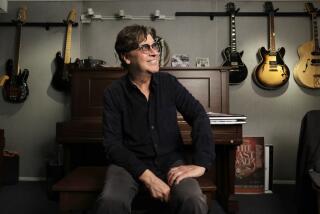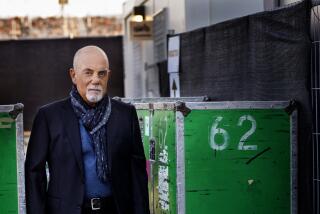Founding member of the Kingston Trio folk group
- Share via
Nick Reynolds, who as a college student grabbed a guitar, donned a broad-striped button-down shirt and quickly helped propel the 1950s folk music revival to the top of the pop music charts as a founding member of the Kingston Trio, died Wednesday in San Diego. He was 75.
Reynolds had been hospitalized in recent weeks with acute respiratory disease, his son, Josh Reynolds, said Thursday.
The group’s recording of the tragic 19th century folk ballad “Tom Dooley” went to No. 1 in 1958 and earned Reynolds and his partners Dave Guard and Bob Shane a Grammy for best country and western performance at the first Grammy Awards ceremony. In that inaugural year, the Grammys had no categories dedicated to folk music, which was booming on college campuses around the country. The following year, the group’s album “The Kingston Trio at Large” picked up a second Grammy for its members. That album spent 15 weeks at No. 1 in 1959.
“The first thing that turned me on to folk singing was Odetta. . . . From Odetta, I went to Harry Belafonte, the Kingston Trio, little by little uncovering more as I went along,” Bob Dylan once said.
Reynolds typically handled the middle part of the trio’s scintillating three-part harmonies, sometimes adding bongos, congas and other percussion accents. Although the group’s music generally shied away from the politicized content of such forebears as Woody Guthrie and the Weavers, its commercial breakthrough in the late 1950s represented a clean-cut alternative to the sexualized rock ‘n’ roll of Elvis Presley, Little Richard, Jerry Lee Lewis and others that had American teens in its grip. And it helped set the stage for folk-rooted protest singers such as Dylan, Joan Baez and Peter, Paul & Mary.
“It really started with the Weavers, in the early ‘50s,” Reynolds said in a 2006 interview, referring to the New York-based quartet that included Pete Seeger. “We were big fans of theirs, but they got blacklisted in the McCarthy era. Their music was controversial. Suddenly, they couldn’t get any airplay; they couldn’t get booked into the big hotels, nothin’.
“We played their kind of music when we were first performing in colleges. But when we formed the trio . . . we had to sit down and make a decision: Are we going to remain apolitical with our music? Or are we going to slit our throats and get blacklisted for doing protest music? We decided we’d like to stay in this business for a while. And we got criticized a lot for that. . . . If Bob Dylan or Joan Baez had come out at that time, they’d have been dead in the water. But four or five years later, [their music] became commercially viable.”
The trio also charted hits with “Tijuana Jail,” “M.T.A.” and Seeger’s “Where Have All the Flowers Gone,” a protest song that became popular with anti-Vietnam War activists and that the group eventually sang on the White House lawn as President Lyndon Johnson and his wife, Lady Bird Johnson, looked on.
Nicholas Wells Reynolds was born July 27, 1933, in San Diego to Stewart Shirley Reynolds, a Navy captain, and Jane Keck Reynolds. The family, including sisters Barbara and Jane, often engaged in singalongs led by their father, a guitarist with an affinity for old folk songs. It was in these sessions that Reynolds developed his facility with intricate vocal harmonies that became one of the hallmarks of the Kingston Trio’s music.
“Nobody could nail a harmony part like Nick,” Shane once said. “He could hit it immediately, exactly where it needed to be, absolutely note perfect, all on the natch. Pure genius.”
After graduating from Coronado High School in 1951, he attended the University of Arizona and San Diego State before enrolling at Menlo College near San Francisco.
During a particularly dull accounting class at Menlo, he noticed a student dead asleep and later introduced himself to Bob Shane.
“He nudged me and said ‘Hey, I’m Nick Reynolds -- have you got a car? Mine just blew up.’ . . . We started singing the first day we met,” Shane said Thursday.
“He was my very, very best friend. It’s a big loss.”
Shane had played music with Guard in their native Hawaii, and when Guard decided to reconfigure his Kingston Quartet, which he had started while studying at nearby Stanford, he drafted Shane and Reynolds.
Guard left the trio in 1961 to form his own group, and was replaced by singer-songwriter John Stewart, who went on to have a significant solo career.
Reynolds left the group in 1967 after the British Invasion rendered the folk style effectively antiquated in the minds of pop music fans, and moved his family to Oregon, where he stayed until the 1980s.
He teamed up with Stewart again for the 1983 album “Revenge of the Budgie,” which also featured Fleetwood Mac’s Lindsey Buckingham, and in 1991 he joined Shane in a reconstituted version of the Kingston Trio.
Reynolds continued performing with Shane until he retired a second time in 2003. Shane bought the rights to the Kingston Trio name in 1976 so he could use it exclusively, and the act has continued to tour with three latter-day members since Shane’s retirement following a heart attack in 2004.
In recent years, Reynolds and Stewart had hosted a “Trio Fantasy Camp” in Arizona, where folk music fans would learn to play and sing many of the trio’s hits and other folk standards. Shane hosted it in August, renaming it the “The Kingston Trio Fantasy Camp” and said he will continue it in memory of Reynolds and Stewart, who died in January of a massive stroke.
Reynolds is survived by his wife, Leslie; sons Joshua Stewart Reynolds and John Pike Reynolds; daughters Annie Clancy Reynolds Moore and Jennifer Kristie Reynolds; and sisters Jane Reynolds Meade and Barbara Reynolds Haines. No services have been scheduled, Josh Reynolds said.--
More to Read
The biggest entertainment stories
Get our big stories about Hollywood, film, television, music, arts, culture and more right in your inbox as soon as they publish.
You may occasionally receive promotional content from the Los Angeles Times.








